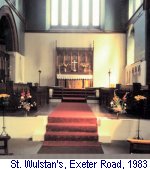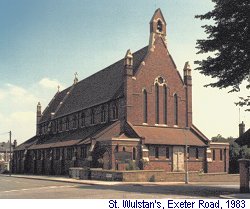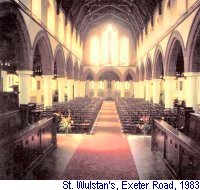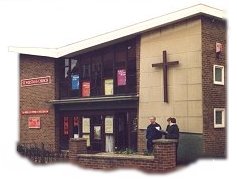The history of St. Wulstan's, Bournbrook
 Originally founded as a mission church by St. Mary's, Selly Oak in 1893, St.
Wulstan's was first located on the corner of Exeter Road in Bournbrook, Birmingham. By
1900, six services were being held in the church each Sunday, including weekly children's
services.
Originally founded as a mission church by St. Mary's, Selly Oak in 1893, St.
Wulstan's was first located on the corner of Exeter Road in Bournbrook, Birmingham. By
1900, six services were being held in the church each Sunday, including weekly children's
services.
After an initial period in a tin hut, the foundation
stone of the church building was laid on St. Wulstan's day (19th January) 1906. The new
church, which could accommodate up to 713 people, was consecrated on October 6th 1906, and
was staffed by a curate-in-charge under the authority of the Vicar of St. Mary's. The
first curate-in-charge was Edmund Arthur Haviland MA, who went on to become Vicar of St.
Mary's in 1909, and became Archdeacon of Kimberley in South Africa in 1915.
On 15 August 1911, the Parish of St. Wulstan was formed
by Order in Council.
 The first vicar of St.
Wulstan's, from 1911 to 1924, was Frederick William Walker MA. He was the first of eight
men to hold the post of Vicar of St. Wulstan's. During his incumbency, four curates spent
time on the staff of the parish. These included Bernard William King, curate at St.
Wulstan's from 1912 to 1917. He subsequently went on to join the staff of St. Patrick's,
Birmingham, then early in 1918, with the permission of the Bishop, he joined the King's
Royal Rifle Corps as a Rifleman, and was killed in October 1918, aged 30, less than a
month before the end of the First World War.
The first vicar of St.
Wulstan's, from 1911 to 1924, was Frederick William Walker MA. He was the first of eight
men to hold the post of Vicar of St. Wulstan's. During his incumbency, four curates spent
time on the staff of the parish. These included Bernard William King, curate at St.
Wulstan's from 1912 to 1917. He subsequently went on to join the staff of St. Patrick's,
Birmingham, then early in 1918, with the permission of the Bishop, he joined the King's
Royal Rifle Corps as a Rifleman, and was killed in October 1918, aged 30, less than a
month before the end of the First World War.
Another two curates served in the parish during the
incumbency of Frederick Clayton Hughes MA, between 1925 and 1935, but it was then another
29 years before St. Wulstan's final curate, Dr. Anthony Bird, joined the staff, during
Charles Hervé's time as vicar.
 By the late 1970s St.
Wulstan's was in decline, with a small but faithful congregation who were unable to
maintain the substantial building, or to use it to best effect.
By the late 1970s St.
Wulstan's was in decline, with a small but faithful congregation who were unable to
maintain the substantial building, or to use it to best effect.
Radical solutions were needed to continue the mission
to serve and witness to the community of Bournbrook.
In 1980, St. Wulstan's amalgamated with the parish of
St. Stephen's, Selly Hill. This merger marked the end of an era in many ways for St.
Wulstan's, as well as being the beginning of a new venture. The churchmanship of the
parish had traditionally been Anglo Catholic, but the merger brought it into an
Evangelical tradition. At the same time, a radical deal brought about a change of
premises. The Elim Pentecostal Church in Selly Oak, which had been present in the area
since the mid 1930s, had a small church building on Alton Road, built in the 1960s. They
were in need of the extra space and the flexibility which a larger building could offer,
whereas St. Wulstan's was seeking a smaller building which was easier to maintain. In
1983, the two churches swapped premises.
It is greatly to the credit of the congregation of St.
Wulstan's that they accepted these substantial changes with such good humour and with
unfailing faith and commitment.
 The congregation of St.
Wulstan's held it's last service at Exeter Road on June 5th 1983, and the first service at
Alton Rd. was held on June 12th 1983. The new building was dedicated by Rt. Rev. Hugh
Montefiore, the then Bishop of Birmingham, on 16th June 1983.
The congregation of St.
Wulstan's held it's last service at Exeter Road on June 5th 1983, and the first service at
Alton Rd. was held on June 12th 1983. The new building was dedicated by Rt. Rev. Hugh
Montefiore, the then Bishop of Birmingham, on 16th June 1983.
After over 20 years of active and enthusiastic worship and witness, changes in the population around the Church and in the leadership of the parish led to further change.
In 2004, the former Church Centre on the Pershore Road - a congregation established by St Stephen's in the 1970s - became an independent parish in its own right - the parish of Christ Church, Selly Park. The two churches of St Stephen's and St Wulstan's continued as the parish of St Stephen and St Wulstan, Selly Park.
When Nigel Lacey, the last Associate Minister of St Wulstan's, left for West Wycombe in 2001, St Wulstan's lost its minister. Leadership was in the hands of a lay team, under the direction of our vicar, Chris Hobbs.
Over time, a number of changes were made - the parish evening service moved to St Wulstan's, the children's work moved to St Stephen's, service times changed, there were changes of staff... Finally the PCC - the Parochial Church Council - decided that holding two parallel morning services each Sunday, at locations less than half a mile apart from each other, was not a wise use of the resources of the parish, and it was decided to end the morning services at St Wulstan's.
Before the decision was implemented, however, a major project was undertaken to completely refurbish St Stephen's to make it more accessible and more suitable for today's worship.
From summer 2014 to summer 2015, the joint congregations of St Wulstan's and St Stephen's met together at St Wulstan's. The last regular morning service was held on Sunday 6th September 2015, after which both congregations moved to the refurbished St Stephen's building.
Throughout the many changes, the congregation of St.
Wulstan's continued as a faithful and committed body of people.
St. Wulstan's today plays host to an evening service, together with a wide range of activities for the parish and other organisations.

[Back]
This site is maintained by
Chris Porter. Created: 15 June 1999 [Last updated:11 September 2015]
 Originally founded as a mission church by St. Mary's, Selly Oak in 1893, St.
Wulstan's was first located on the corner of Exeter Road in Bournbrook, Birmingham. By
1900, six services were being held in the church each Sunday, including weekly children's
services.
Originally founded as a mission church by St. Mary's, Selly Oak in 1893, St.
Wulstan's was first located on the corner of Exeter Road in Bournbrook, Birmingham. By
1900, six services were being held in the church each Sunday, including weekly children's
services.  The first vicar of St.
Wulstan's, from 1911 to 1924, was Frederick William Walker MA. He was the first of eight
men to hold the post of Vicar of St. Wulstan's. During his incumbency, four curates spent
time on the staff of the parish. These included Bernard William King, curate at St.
Wulstan's from 1912 to 1917. He subsequently went on to join the staff of St. Patrick's,
Birmingham, then early in 1918, with the permission of the Bishop, he joined the King's
Royal Rifle Corps as a Rifleman, and was killed in October 1918, aged 30, less than a
month before the end of the First World War.
The first vicar of St.
Wulstan's, from 1911 to 1924, was Frederick William Walker MA. He was the first of eight
men to hold the post of Vicar of St. Wulstan's. During his incumbency, four curates spent
time on the staff of the parish. These included Bernard William King, curate at St.
Wulstan's from 1912 to 1917. He subsequently went on to join the staff of St. Patrick's,
Birmingham, then early in 1918, with the permission of the Bishop, he joined the King's
Royal Rifle Corps as a Rifleman, and was killed in October 1918, aged 30, less than a
month before the end of the First World War. By the late 1970s St.
Wulstan's was in decline, with a small but faithful congregation who were unable to
maintain the substantial building, or to use it to best effect.
By the late 1970s St.
Wulstan's was in decline, with a small but faithful congregation who were unable to
maintain the substantial building, or to use it to best effect. The congregation of St.
Wulstan's held it's last service at Exeter Road on June 5th 1983, and the first service at
Alton Rd. was held on June 12th 1983. The new building was dedicated by Rt. Rev. Hugh
Montefiore, the then Bishop of Birmingham, on 16th June 1983.
The congregation of St.
Wulstan's held it's last service at Exeter Road on June 5th 1983, and the first service at
Alton Rd. was held on June 12th 1983. The new building was dedicated by Rt. Rev. Hugh
Montefiore, the then Bishop of Birmingham, on 16th June 1983.